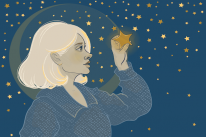
“We cannot be more sensitive to pleasure without being more sensitive to pain.” ~Alan Watts
Are you good at noticing subtle details? Are you able to learn without really being aware that you are learning? Do you notice other people’s moods? Do these moods affect you?
Are you sensitive to pain? Are you equally sensitive to beauty?
If you answered yes to these questions, chances are that you, like me, are a Highly Sensitive Person (HSP). Chances are, you are constantly trying to make sense of how being sensitive fits into a world where a certain amount of insensitivity is seen as the key to getting ahead.
Chances are, you have both deeply valued your sensitivity and pushed away from it. While it makes up the core of who you are, it also makes life complicated.
Like you, I have struggled with being sensitive. First, it was because I had absorbed the cultural definition of sensitivity as weakness. And then when I did start understanding what being an HSP meant, starting from reading Elaine Aron’s classic The Highly Sensitive Person, I struggled to integrate this knowledge in my life.
Today, while I still find my sensitivity tricky, I have started seeing it differently. Now, when I think about sensitivity, the picture that comes to mind is of a thoroughbred horse.
This horse has a lot of nervous energy. It also has many gifts.
When I can direct this horse properly, it has the capability to perform at the highest standards. But if I misunderstand it, the horse’s energy is scattered, out of control. It can’t even get out of the gate.
So, how do we guide and direct this horse? How do we gallop out into the world instead of shying away from it? How do we bring our sensitive gifts to life?
Let’s look for some answers.
As sensitive people, we first need to ask: What holds me up?
At some point in your life, you might have absorbed the words that most HSPs hear: “You are too sensitive,” “You feel too much.” You might have believed these negative injunctions and gone through life in the absence of people who could see your gifts and champion them.
If you are still looking for those people, now is the time to go on a quest for them. While it may take time to find a friend or adviser, the process of exploring can itself be rewarding.
As an HSP, I have greatly benefited from being a part of online HSP groups. They help me see that I am not the only one having my experiences. I have also found people walking ahead on the path, and seeing them lead their lives shows me the way for leading mine.
We all need this—to be seen and validated for who we are. And when we find our believing mirrors, whether HSPs or non-HSPs, we can have the containers that shelter us from the storms of over-stimulation and anxiety.
And while we are working to find our champions, we also need to move inside and learn how to give ourselves what we need. When I moved from India to the United States two years back, I struggled with exactly this. In the absence of a support network, I did not know how to take care of myself.
How could I give myself love and attention? Wasn’t it what someone else gave to you?
Then, out of sheer necessity and through some trial and error, I started getting a glimpse of what nourishing ourselves means. I volunteered as a reading tutor, took photography classes, and embarked on my dream of being a writer.
In those moments when I felt connected to something bigger, I felt whole. There was nothing missing.
I started understanding that this was my area of growth, that this is what Elaine Aron means when she says that “part of maturing into wisdom is transferring more and more of your sense of security from the tangible to the intangible containers.”
So, think of all your safe harbors, all the containers in your life. Do you have enough of the intangible ones—work, faith in something bigger, a spiritual practice? Know that you can create an internal structure that holds you up, that sustains you emotionally even as people move away or life changes.
Once you have this inner stability, you can ask:
How do I participate in the world more?
As an HSP, being on the margins of the culture might have contributed to you feeling “less than.” Or you might have had a traumatic experience that you felt keenly, and you might not have found your way out of it.
Whatever the basis of low self-esteem, the truth is that without having a basic sense of self, we are adrift. Among other things, one of the reasons that I clung on to my ill-suited corporate job for years was the feeling that I would crumble into nothing without it. And I wasn’t very sure that I deserved something better.
In his wonderful Honoring the Self, Nathaniel Branden talks about this, and says, “The greatest barrier to achievement and success is not lack of talent or ability but rather, the fact that achievement and success, above a certain level, are outside our self concept, our image of who we are and what is appropriate to us.”
So, if we don’t believe that we deserve something better, we will often unconsciously put up barriers to getting it. The good news is that we can build our sense of self, brick by brick.
I strengthened my self-esteem by taking small risks, which grew into something bigger.
I left my low self-worth job for a better one. I freelanced on the side.
In effect, I worked hard and took concrete actions to earn my own respect.
Having once earned it though, it’s important that we keep acting to maintain our self-belief. For some time during my transition to the United States, my sense of self became shaky again. In the last several months, I have started remembering what I had learned—that action builds our sense of self.
I started to take risks again. One of them was coming out as an HSP through my writing.
My entire experience of life has been colored by my sensitivity, and yet I felt like it was something I needed to hide, fearful that people would label me. They still might. But I am a little more okay with sharing myself discerningly; reaching out in those spaces where I feel it can be helpful to others.
Whoever you are, wherever you stand, the task of building yourself up and finding your lost spaces is not going to be easy. But it is going to be worth it when you can stand in your center, and live from that place.
In the end, the fundamental question that we are all asking is:
How can I be more of myself?
As HSPS, we have the additional task of unlearning all that we have learned. We might have adapted in the wrong ways. Instead of learning to manage our feelings of overwhelm, we might have started avoiding the world altogether. Or we might have shrunk inside, hurt at being misunderstood.
But the world needs people like us—people who can empathize, who care, who can feel others’ pain. It is both our privilege as well as our challenge to learn how to do this effectively.
We need to take up more space, to show up as who we are. We need to unfurl.
It’s time to bring our sensitive gifts into this world.
Photo by Marta Nørgaard
About Ritu Kaushal
Ritu Kaushal is a San Francisco Bay Area-based author and blogger. Her book The Empath’s Journey weaves personal stories of her experiences as a highly sensitive person with insights from different psychological theories including the works of Carl Jung, Erich Fromm, Jeremy Taylor, and many others. Sign up for her monthly newsletter on her HSP-centric blog at walkingthroughtransitions.com.













 Though I run this site, it is not mine. It's ours. It's not about me. It's about us. Your stories and your wisdom are just as meaningful as mine.
Though I run this site, it is not mine. It's ours. It's not about me. It's about us. Your stories and your wisdom are just as meaningful as mine.
This was a lovely and timely post – thank you <3
Glad it resonated !
Amazing post! Gained a new perspective on being sensitive.
I am naturally quite sensitive to feelings of both mine & others. I used to feel bad about it. I thought it was a weakness. A man should not be so sensitive ( bad social conditioning from media). But time went on & as i gained newer perspectives, it turned out to be one of the best qualities in my personality.
Sensitivity is a gift. You just have to learn to use it in the right way.
Thank you ! Glad it connected. It’s great that you feel this way. I can only imagine how tough it must be for sensitive men in today’s culture. It’s wonderful that you see your sensitivity as a gift.
“My entire experience of life has been colored by my sensitivity,
and yet I felt like it was something I needed to hide, fearful that
people would label me. They still might. But I am a little more okay
with sharing myself discerningly; reaching out in those spaces where I
feel it can be helpful to others.”
As a highly sensitive person, this is been one of my biggest challenges in life as well….Thank you so much for sharing your story; I could truly relate to this blog in so many levels including the feeling of IDENTITY CRISIS of being torn between finding that balance of Indian & American Culture….
Wonderful article; There are no mistakes I read it when I did. Thank you!